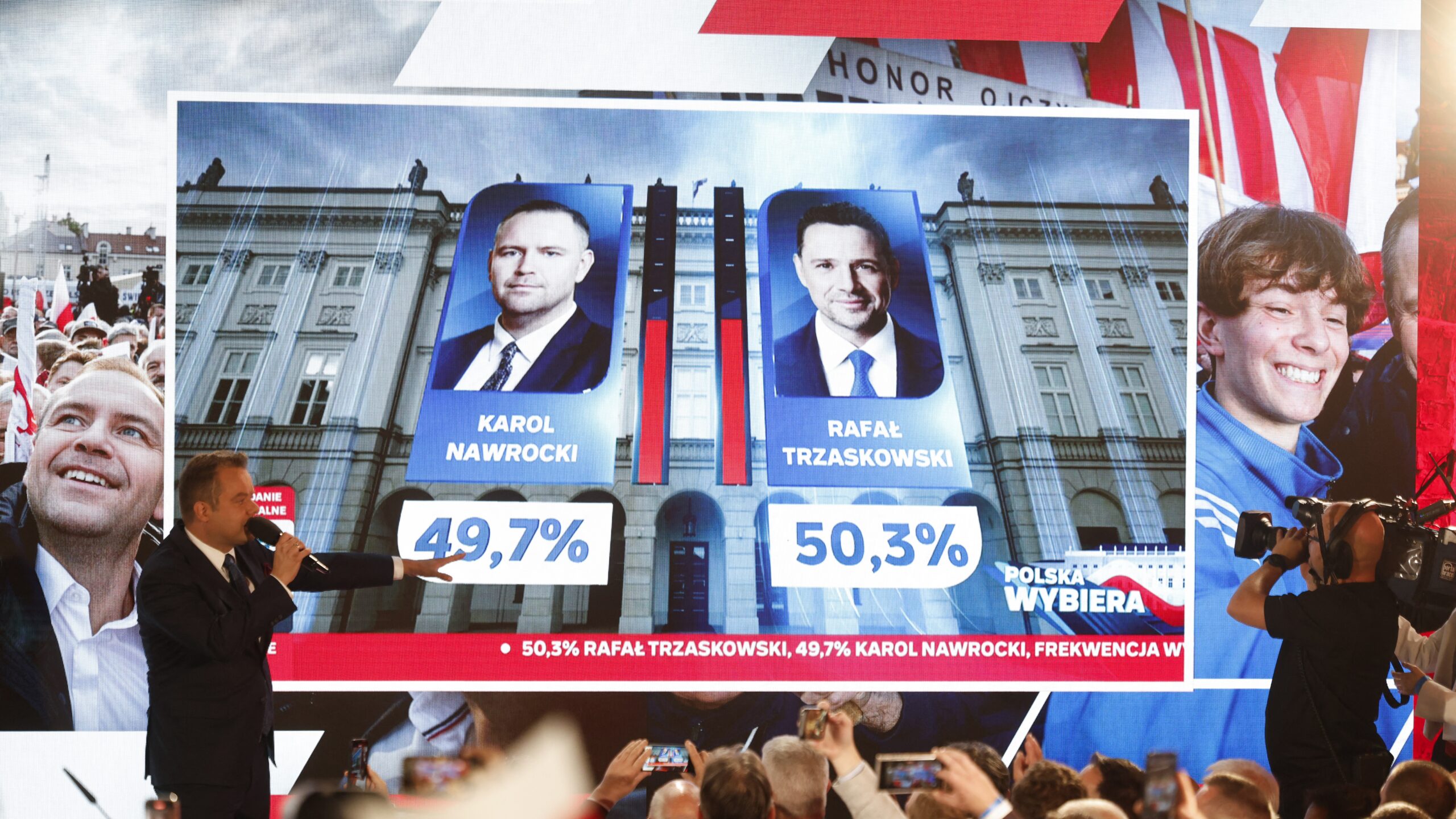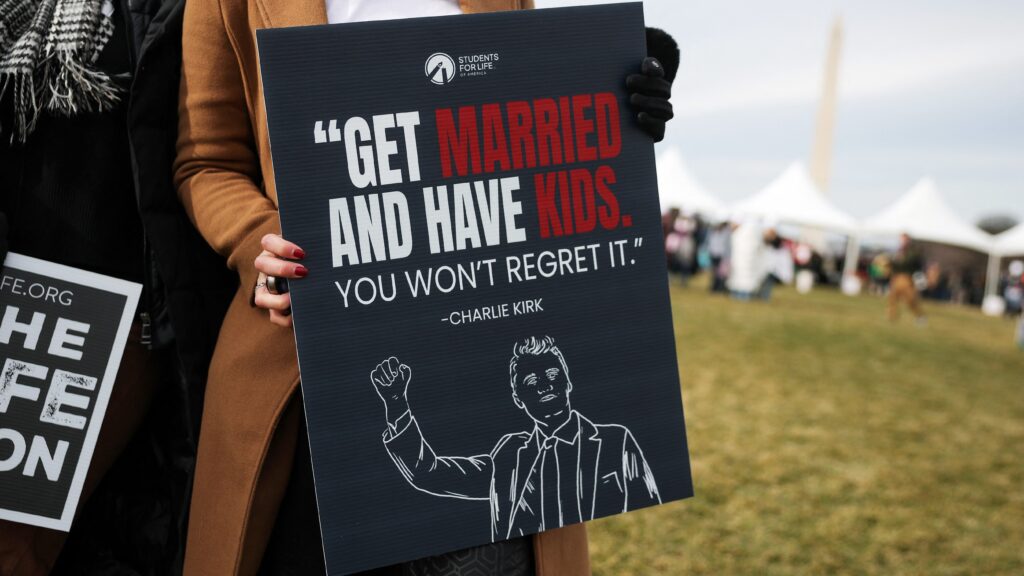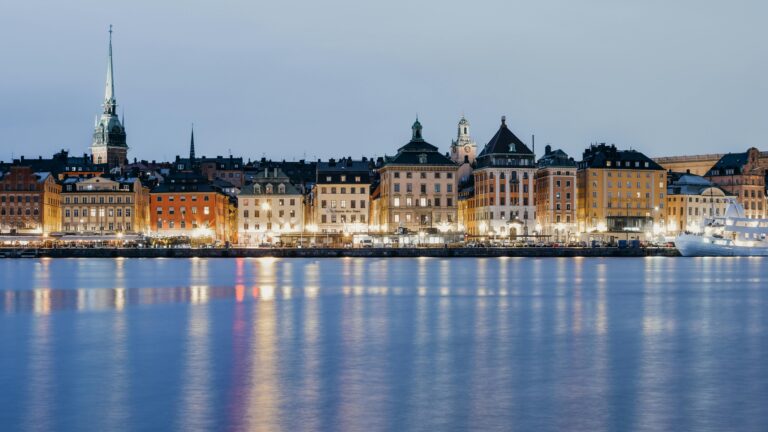It should have been a victory party. As the first electoral results came in, activists from Poland’s ruling Civic Platform party, led by Prime Minister Donald Tusk, clung to hopes of a late-night turnaround. But as the night progressed, it became clear that what had once seemed a won battle was, in fact, a lost cause. Much to the surprise of external observers and much of Poland’s mainstream press, Rafał Trzaskowski, the Mayor of Warsaw and long-time frontrunner in this year’s presidential election, had lost. Karol Nawrocki, a conservative historian from Gdańsk and head of the Institute for National Remembrance—a think tank dedicated to studying Nazi and Communist crimes against Poland—had just been elected president, against all odds. Running as an independent endorsed by the conservative Law and Justice (PiS) party, Nawrocki overcame Trzaskowski’s double-digit lead in under two months, uniting often conflicting factions of the Polish right against his Tusk-backed rival. Unlike Trzaskowski’s campaign, Nawrocki’s focused masterfully on social and cultural issues, questions of national identity, and the candidates’ contrasting visions of Polishness. This strategy not only proved effective, but also affirmed the enduring strength of conservative and traditional values in Polish society—despite recent electoral setbacks for the right. For Civic Platform supporters, and for many outside Poland who had viewed Trzaskowski’s victory as all but certain, the day after left only one question: how did this happen?
Any politician or party, liberal or conservative, left- or right-leaning, across Europe, should ask this question—as no one is immune to the mistakes the Civic Platform committed.
Warsaw Blues
The choice of Trzaskowski as Presidential candidate would appear logical under most circumstances. The position of Mayor of the capital city is, in the European context, akin in relevance and prestige to that of the High Offices of State. Differently from the Americas, European capital cities tend to be the economic epicentre of their countries, as well as their main loci of cultural and intellectual developments. To be at the helm of a capital is to not only be responsible for its functioning, but also to have a role and a voice in the direction of those very cultural and economic dynamics that render the city unique. Under normal circumstances, a capital city Mayor should be a strong contender for either the Presidency or the Prime Ministership of his or her country—and this has, historically, been the case throughout Europe. Leaders as diverse in ideology and historical position as Boris Johnson, Jacques Chirac, and the late Polish President Lech Kaczyński have governed their respective countries’ capital cities before taking the helms of their nations. You could even include ex post the legendary German Social Democratic Chancellor Willy Brandt in the list—even if, technically, Berlin would not serve as the capital of (West) Germany until many decades after his Mayoral term. Most recently, the liberal-progressive Mayor of Bucharest, Nicusor Dan, defeated nationalist MP George Simion in a tightly-contested campaign for the Romanian Presidency. Coeteris paribus, Trzaskowski would have been an ideal candidate for the Civic Platform. The world, however, does not operate coeteris paribus.
‘The ideological division, which in Europe is reflected in the left–right political spectrum, is now complemented by a much more pronounced urban–rural divide’
Politics in 21st-century Europe have been marked by two interconnected cleavages, one ideological, and one geographic. If in the 20th century political calculations could be made primarily on an ideological basis with the geographical factor as a secondary consideration, in the present day—and especially since the 2010s—both must be considered equally and interchangeably. The ideological division, which in Europe is reflected in the left–right political spectrum, is now complemented by a much more pronounced urban–rural divide. These divisions are both a product and a cause—in this order—of the intensification of the left–right polarization the continent has observed, and, concurrently, of the decline of once-dominant centrist forces. In Poland, the urban–rural divide has superimposed itself on another, historical dividing line that follows the course of the Vistula River. The Vistula line divides Poland into a Western part, which tends to be regarded as the ‘modern’, secularized, Civic Platform-voting half of the country, and a Catholic, rural, and conservative East. The two parts of the country are known, though somewhat condescendingly, as ‘Poland A’ and ‘Poland B’—a moniker favoured by those pertaining to the former. Much of ‘Western’ Poland was under German rule until the end of the Second World War, while much of ‘Eastern’ Poland has, historically, been part of the Austrian and Russian Empires before becoming independent in the 1920s.
Warsaw offers us a perfect example of this trend. The capital was once ideologically diverse enough to have elected one of the most iconic politicians of the Polish right, Lech Kaczyński, as its mayor. Since 2010 all mayoral elections have been won by candidates from the Civic Platform, in increasingly large margins. This trend has been observed across Poland. The larger a city is, the more likely it is that it will be governed by either the Civic Platform or another member of the Tusk-led coalition. Conversely, the more rural a voivodeship is, the more likely it is to be governed by PiS—or, at least, to deliver above-average votes to that party and its competitors to the right. Warsaw was no exception to the trend of crystallization of political ideas over the course of the 2010s and early 2020s—notably during the PiS years. The city’s status as Poland’s political and economic centre gave it—and its local authorities—the outsized role that is typical of a capital. Warsaw was the epicentre of mostly liberal-led protests against the government on topics as broad as abortion, judicial reform, and relations with the European Union. In its ornate, reconstructed streets, the nation’s political fault lines were laid bare.
The beginning of Rafał Trzaskowski’s political trajectory as a major figure broadly coincides with that of PiS’ time in power. A scion of the capital’s intellectual bourgeoisie, Trzaskowski is an archetypical representative of a new form of this bourgeois society, one that has developed across Europe since the turn of the century. His academic and professional background, as well as his political positions, further consolidate his status in this new urban zeitgeist, to which Central and Eastern Europe is not immune. In this sense, it ought to be said that both Trzaskowski and Nawrocki have highly educated, even academic profiles—a rarity in today’s politics. Their debates, their different views of Poland and its place and role in Europe, are as much dictated by political strategy as they are by both men’s well-developed intellectual worldviews. Nawrocki is a historian of the Polish 20th century, focused on the crimes committed by the Nazi and Communist regimes against his nation. Trzaskowski is a scholar of European Studies and a graduate of the College of Europe, the EU’s elite cadre-forming institution par excellence. His academic work, as well as his early political career, were dedicated to the subject of European integration, to which he developed a strongly favourable view—a view shared lato sensu by most Poles. During the early 2010s, Trzaskowski served as a Member of the European Parliament, then as a Minister for European Affairs and an MP. He was elected Mayor of Warsaw in 2018 and comfortably re-elected in 2023.
‘A scion of the capital’s intellectual bourgeoisie, Trzaskowski is an archetypical representative of a new form of this bourgeois society’
Trzaskowski’s tenure as Mayor of Warsaw saw him become the de facto leader of the Civic Platform’s liberal-progressive wing. If his early political career was defined by European integration, his Mayorship is defined by a strong commitment to that fixed set of values that has defined the urban European bourgeoisie of the 21st century. Trzaskowski, at this point, was not only an adherent to these values, but a standard-bearer and an opinion-maker, as the might of his office entails. In Poland, the battlefields where the seemingly unavoidable Kulturkampf is fought lie in socio-cultural and foreign policies. The other area of perennial conflict between liberal and conservative Poles—or, rather, internationalists and sovereigntists—namely, migration, is still covered by a timid consensus regarding the harmful effects thereof. Tusk, be it by conviction or by pure pragmatism, has mostly continued, though with some concessions, PiS’ tough line and closed-borders approach—and when Tusk speaks, the rest of the party listens. The main points of conflict between Trzaskowski and PiS were Europe, local- and national-level LGBT policies, and Poland’s abortion laws. In all three, Trzaskowski took positions that are aligned with the broad European progressive mainstream, not shying away from performative actions intended to showcase his support thereof. Seeking to polish his secular—which, in Poland, means ‘anti-clerical’—credentials, despite identifying as Catholic, he had the crucifix and a monument to Pope John Paul II removed from the City Hall. Trzaskowski, in his double-role as Mayor and national-level progressive lodestar, proved to be an ideal candidate for Mayor of Warsaw in the early 2020s—and this, ultimately, would cost him the Presidency.
The Price of Hubris
Trzaskowski was selected as the Civic Platform’s candidate in a primary vote held by the party’s 25,000-strong membership, which he won by over 75 per cent. He faced off Foreign Minister Radosław Sikorski, another staunch Europeanist known for his hawkish positions on Ukraine. The two profiles were markedly different, however. Sikorski is a member of Tusk’s cabinet, and, despite his hawkish stances on Ukraine and Russia, is mostly a centrist elsewhere. If anything, he is best remembered for his views on matters outside of Poland than inside. Trzaskowski, on the other hand, made his name in local politics tinted with progressive activism and opposition to PiS as a party and national conservatism as an ideology. For a political party that has defined much of its last electoral campaign in opposition to the government, rather than in favour of a certain programme, the choice was clear. That Trzaskowski had lost a Presidential campaign five years before, that much of the crucial electoral demographics were in rural Poland, that those Poles would not likely support a liberal-progressive programme—those were secondary considerations.
In choosing Trzaskowski for the Presidential elections, the Civic Platform made a mistake that has become commonplace in polarized countries: the lack of acknowledgement of one’s part in that polarization. This is a mistake born out of hubris permeated by liberal-progressive moral absolutism. To engage in self-reflection, be it as an individual or as the head of a political collective, is in itself a difficult task. It is made herculean by hubris. Paradoxically, hubris and this lack of self-reflection are interconnected phenomena—one feeds into the other, creating intellectual aloofness and disconnection with the electorate one is bound to. In practical terms, one is aware of the risks and sensitivity of the political climate, of the societal factors driving that polarization and benefiting therefrom, but unable to acknowledge either one’s position in the system or role in perpetuating those very dynamics. Liberal-progressive hubris is very specific in this regard in its use of moral imperatives for its own justification. Under this logic, polarization exists, but it is entirely the fault of one’s political opponents—be they conservatives, ‘the far-right’, loosely defined, or an external actor of choice. The electoral process is made deontological: the choice is not between two political projects, or between more national-level governance versus EU-level governance, but rather a choice of right versus wrong, of good versus evil. This logic transcends electoral rhetoric and is elevated into the party’s guiding principle. This was the case for the Civic Platform membership.
‘The choice is not between two political projects, or between more national-level governance versus EU-level governance, but rather a choice of right versus wrong, of good versus evil’
Liberal-progressive hubris manifests itself in two ways. The first is the imposition of its own moral imperative into a broader political context. The second is the ‘othering’—to use a sociological concept dear to the political and academic left—of political opponents in extra-political terms. The discourse often employed by Polish liberals and left-leaning politicians and intellectuals since the PiS years implied a self-evident moral, intellectual, and even cognitive superiority of their positions over their adversaries’. This is not unique to Poland. Such hubris-based political considerations have been behind much of left-liberal political thought in the West, which derides its detractors not as political opponents, but, at best, as ‘uneducated’ masses and, at worst, as ill-intentioned actors—usually a combination of both. Above all, belonging, or being adjacent, to the political forces promoting these views, is seen as a moral imperative—ergo, defending other points of view is intrinsically bad. In Poland this was manifested in the adoption of a self-denying Westernizing fervour that rejected both overt Polish nationalistic manifestations and Catholicism as a key aspect of Polish identity. For Polish liberals, the ideal model was that of the hyper-secular liberal-progressive zeitgeist that has dominated most Western European capitals since the late 2000s. For most of the Polish population, even those dissatisfied with PiS, this proved, instead, to be a deal-breaker.
The primary results showed that, in the view of most Civic Platform members, even those voters who might not share Trzaskowski’s progressivism, his rejection of the public role of Catholicism, or his enthusiasm for the EU, would back him over any PiS-supported candidate. Nobody would risk being, as that now-classical motto of liberal hubris, ‘on the wrong side of history’. While carefully managed by Tusk and the centrist cadres of the Civic Platform, this liberal fervour was visible in the protests that rocked Warsaw and found a supporter in Trzaskowski. Therein lies the risk of holding closed primaries in a country that lacks a culture of mass party membership like those of the United States or Austria. In any country where party membership and participation are restricted to a niche, that niche is much more likely to diverge from said party’s core electorate. Most Civic Platform voters are centrists, closer in social, economic, and foreign policy stances to Tusk and even to non-party members like Marshal of the Sejm Szymon Hołownia than they would be to Trzaskowski. Much of the party’s electorate is rural, in Western and Central Poland, areas that, though less conservative than their Eastern counterparts, retain much of their core Catholic, patriotic conception of Polishness. One thing they do share with Trzaskowski is his strong pro-Europeanism and commitment to loosely-defined ‘European values’—though this, even if interpreted differently by different groups, tends to be a common thread across the political spectrum, apart from Konfederacja. The party membership, in turn, is much more urban, much more liberal, and much more socially progressive and aligned with the Western-inspired zeitgeist. If a centrist candidate would have been preferred by the broader electorate—and, possibly, won the Civic Platform the election—he is instead rejected by the much more ideologically compact membership. The party membership, in assuming their own view to be Poland’s, chose a Mayoral candidate to run for the Presidency. And it did not pay off.
The story of why Trzaskowski lost the Presidential election is less about him than it is about the hubris of certain political classes and activists in the present day, and the miscalculations they lead to. Trzaskowski, despite his views, performed well in the election, losing to Nawrocki by a small margin. By any metrics, however, including PiS-leaning ones, any Civic Platform candidate should have emerged as a clear winner. The governing party had a clear advantage over both PiS and Konfederacja candidate Slawomir Mentzen, with Tusk touting the Presidential vote as crucial for the accomplishment of the liberal programme of his ruling coalition, and the overcoming of the Presidential veto. Furthermore, Trzaskowski was a much more well-known figure than Nawrocki, who was, at best, familiar amongst historians and conservative activists. Trzaskowski lost because he should never have been the candidate—because his party distanced itself from its own electorate to the point of no longer being able to read their intentions, desires, and positions. Add to that the ever-growing urban–rural divide in present-day Europe, which, in this case, proved too steep even to be acknowledged by a party membership that is mostly urban and liberal-leaning. This was seen throughout the campaign, and Nawrocki would go on to use it to his own advantage.
In polarized societies, hubris is a dangerous temptation, one that may tempt liberals, conservatives, and traditionalists alike. Hubris prevents proper, rational assessments of complex situations and the acknowledgement of ideological, cultural, and societal elements of equal or greater strength than one’s own. As conservative movements in Poland and beyond rightfully celebrate the victory of Nawrocki, they, too, should be mindful—when their time comes to present themselves once again to voters—not to repeat the path of the Civic Platform in this campaign.
Related articles:







